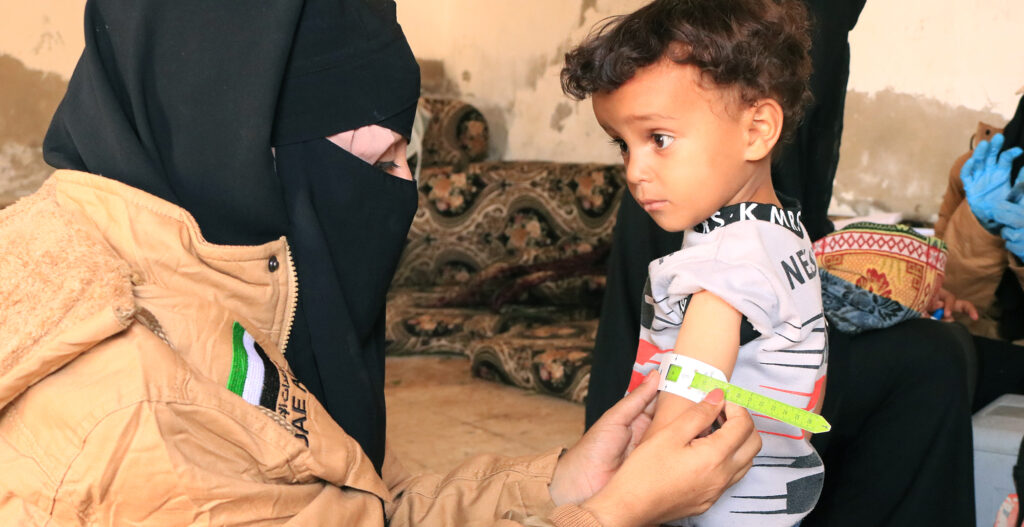Fifteen-month-old Shefa was once full of energy. She had just started taking her first steps, and was curious to explore her surroundings. But then, she started losing weight rapidly and became lethargic. She lost her cheerful nature and stopped playing with other children her age. Her mother did not know what was wrong, and watched helplessly as Shefa’s condition deteriorated every day.
International Medical Corps’ Nutrition team found out about Shefa during routine outreach activity in the mountainous district of Al Hussein, in Al Dhale’e governorate. They measured her height, weight and mid-upper arm circumference (MUAC) and found that she was suffering from moderate acute malnutrition.
Shefa is one among millions of Yemeni children suffering from malnutrition. As the country—wracked by civil war since 2014—faces outbreaks of disease, economic crisis, fuel shortages, rising inflation and food insecurity, the numbers emerging on humanitarian indicators are grim. Today, more than 80% of Yemenis live below the poverty line, with women and children being the most underserved communities. According to UNICEF, one child dies every 10 minutes. The health system in the country is barely functioning. In places where it does, most patients cannot access healthcare facilities due to the high cost of transportation resulting from fuel shortages.
With support from the United Arab Emirates, through the Famine Relief Fund, International Medical Corps is implementing an emergency nutrition project in southwestern Yemen, providing nutrition services to children under 5 and pregnant and lactating women (PLWs) in Al Dhale’e, Lahj and Taiz governorates. Under this project, we support 22 health facilities and six mobile teams with medications, nutrition commodities and other essential supplies. To ensure that the medical and nutrition supplies are stored properly, we have installed solar panels and eight air conditioners in five health facilities. We also promote maternal, infant and young-child feeding in emergencies, as well as proper hygiene among PLWs and caregivers, helping to efficiently treat and manage malnutrition. In addition, we are providing multi-purpose cash assistance to households that include children undergoing treatment for severe acute malnutrition (SAM) with medical complications.
Upon discovering Shefa’s condition, our Nutrition team counseled her mother on healthy feeding practices and prescribed nutritional supplements. Shefa’s health is gradually improving, and she is gaining weight. “I am thankful to International Medical Corps for saving my child. I pray they can reach more children like Shefa and help them improve their health,” said Shefa’s mother.
Under the emergency nutrition project, we organize medical outreach activities in Al Hussein district every week. We provide four primary healthcare services—expanded immunization programs, integrated management of childhood illness, community-based management of acute malnutrition and reproductive healthcare—in the hardest-to-reach areas. Most villages are located on top of mountains and lack proper roads. But a hostile physical environment does not deter our team members from doing their work. “It is not easy for us to reach these villages,” explains Hafitha, a health worker at International Medical Corps. “Sometimes, we have to carry our equipment while walking in hilly and rugged terrain.”
Treatment and training go hand-in-hand
Training is the cornerstone of our work. Wherever we provide medical assistance, we also train health workers, volunteers and community members to provide them with the skills and knowledge they need to become self-reliant.
Sarah Ahmed is a housewife and mother of three. Her husband has no steady income, and the family struggles with such basic needs as food. She noticed that her 3-year-old daughter, Awadhah, was not eating well and had become lethargic. Sarah was confused and did not understand the sudden change in her behavior.
One day, our Nutrition team visited Sarah at her home in Albahrah village in Al Mukha district during their routine rounds. They explained to her the importance of regularly measuring the MUAC to monitor her children’s nutritional status, and taught her how to measure it. They also explained to her the different stages of malnutrition. With the new knowledge she gained, Sarah understood that Awadhah was suffering from SAM, and immediately took her daughter to a nearby health center for treatment. Afterwards, Sarah diligently measured Awadhah’s MUAC and noted the changes in a diary to chart her daughter’s progress. She shared her findings with our Nutrition team and asked for advice. Following the timely action she took, Awadhah’s health began to improve.
The Nutrition team also explained to Sarah the importance of breastfeeding and a balanced diet. She now regularly breastfeeds her youngest child, Abdullah, who is 14 months old, to protect him from diseases and to keep him well-nourished.
“I am glad I received such good advice and training from International Medical Corps’ Nutrition team,” Sarah said. “I can now support and protect my children, and I will encourage other mothers in my community to do the same.”
Since we started implementing the family MUAC activity in Al Mukha under the nutrition intervention program, we have trained more than 280 mothers. Sarah is just one example of how training and timely treatment can help fight malnutrition.
“There are still many children out there who need our help. We need to redouble our efforts to combat the malnutrition spreading rapidly among Yemeni children,” says Ebtisam Dayah, Nutrition Program Manager.
